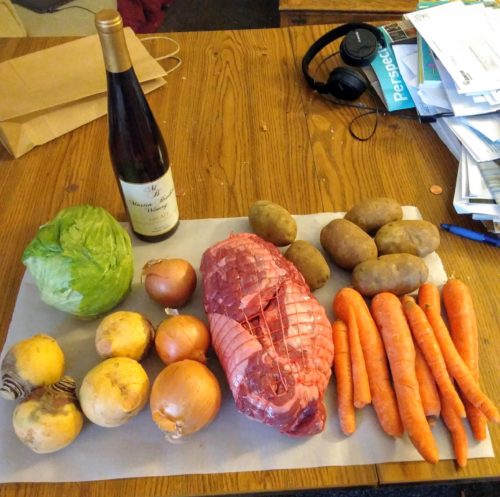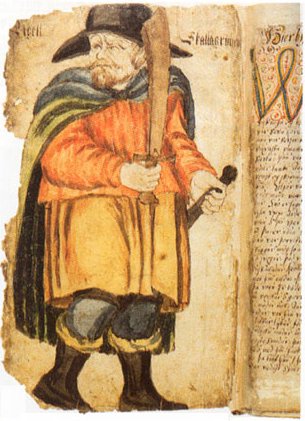Pagan Perspectives
Today’s column comes from your humble Weekend Editor, Eric O. Scott. Eric was raised by witches. He has a PhD in creative nonfiction writing from the University of Missouri and has written for The Wild Hunt since 2012.
The Wild Hunt always welcomes submissions for our weekend section. Please send queries to eric@wildhunt.org.
Another ninth of December has come and gone; and with it, another pot of kjötsúpa, the Icelandic lamb stew I make once a year in honor of the Viking poet and hero Egill Skallagrímsson. That brings me up to six so far. It remains a simple recipe, a broth-less soup of lamb, root vegetables, herbs, and a handful of barley. But, it is still my favorite dish to cook.
To tell the truth, I had some apprehensions about this year’s feast for Egill. I started holding this party the year I moved to Columbia, Missouri to begin a doctoral program, and the people I invited to share my soup were the only friends I had at that point: the medievalists with whom I had just finished reading Egil’s Saga. (I have never considered myself a medievalist, but they let me pretend I belonged.) It was a moment at the end of the semester to bond, reflect, and relax, poised between the last week of classes and the beginning of the final exam week and, more importantly for us as graduate workers, the deluge of final exam grading to come.
This is the first December since I finished that doctoral program; I am no longer part of the academy, nor of the strange culture of graduate education, balanced between the roles of advanced student, cheap labor, and unproven scholar. I haven’t moved away from Columbia, but the fact is that friendships made in a certain context tend to become strained once that context changes. My life no longer fell into the same rhythms as my friends’, and I wondered how this would change the tenor of my ceremony. Thankfully, though the gathering was small, it was warm as ever, and some friends who had never visited before joined us.

Before the soup [E. Scott].
I do not often invite others into my home, unfortunately; I suffer from the same kind of physical isolation from others that besets many in western capitalist societies, where, although there is nothing stopping us from sharing one another‘s company in person, it is not the way we usually think to interact. While I am not a social media scold – I have many wonderful relationships that exist only because technology allows me to remain close to people who are physically very far away – I can‘t deny that the physical isolation is almost certainly abetted by the fact that almost all of my friendships are mediated through technology.
Paganism, however, has always granted me an exception to this situation. My Pagan family, Sabbatsmeet, is named for the practice of gathering on holy days, and – for forty years as of Samhain – that tradition has held up. There was a time in my twenties when, feeling disenchanted with my family‘s practices, I sometimes scoffed that our sabbats had only become excuses to have parties, that we had lost sight of the magick. I think about it now, and I realize that there is something quite magickal about our repeated pattern of gathering every six weeks, despite how different the world looks now compared to 1978. Sometimes we put on a ritual that is transcendent, and sometimes we put on a ritual that is dull – but we put on a ritual, together, regardless, and that long history of shared practice creates a tradition with far greater depth than I once gave credit.
My feast for Egill Skallagrímsson takes up a similar place in my mind. It gives me a reason to reach out to friends who I do not see as often as I should and invite them into my home to share a meal and a few hours of conversation, and it gives me an excuse to immerse myself in the memories of eating kjötsúpa while walking the streets of Reykjavík the first summer of my graduate program, and it gives me a moment of quiet and order at the beginning of the winter once all the leftover soup has been put away and all the friends have made their way home.

Egill Skallagrimsson, from a 17th century Icelandic manuscript of Egils saga [public domain].
It is a cold night, and I am standing outside without a coat. We have already had multiple snows in Missouri this year, the first coming in early November, far earlier than normal. This doesn’t bother me, despite a lifetime of winter-time rituals that have focused on how we will survive the dark and cold and will soon return to the light and warmth of summer. I am grateful for the snow, for the cold, for the dark. Light is not good and dark is not bad; we’ll die from too much of either. Our world is now too engulfed in light. I welcome the calm and silence of the dark.
As the soup steams in the chill air, I whisper a prayer to the land wights. Hail to thee, spirits of the earth, I say beneath my breath. Grant us a winter that is as long, as cold, and as dark as it needs to be. Thank you for being with me at the table for this feast. Enjoy your slumber, and dream of a world in balance.
The Wild Hunt is not responsible for links to external content.
To join a conversation on this post:
Visit our The Wild Hunt subreddit! Point your favorite browser to https://www.reddit.com/r/The_Wild_Hunt_News/, then click “JOIN”. Make sure to click the bell, too, to be notified of new articles posted to our subreddit.